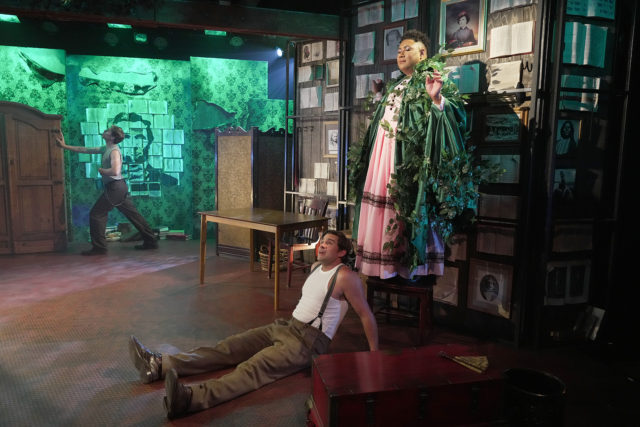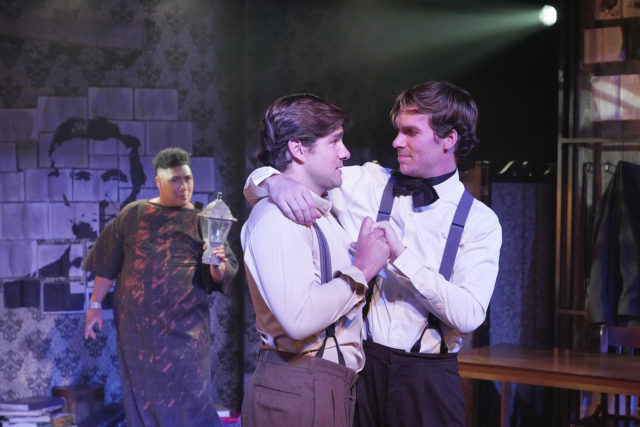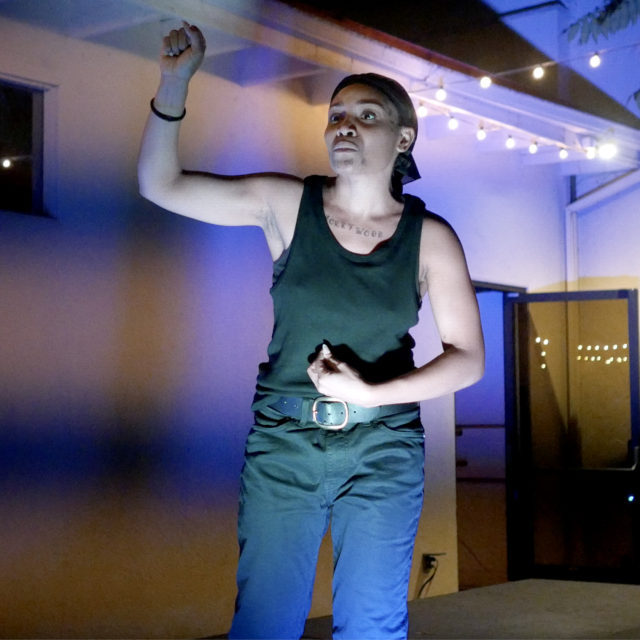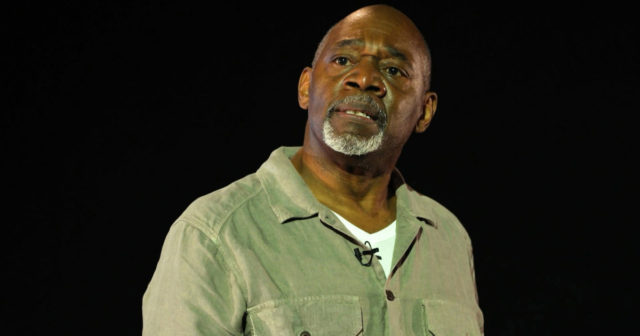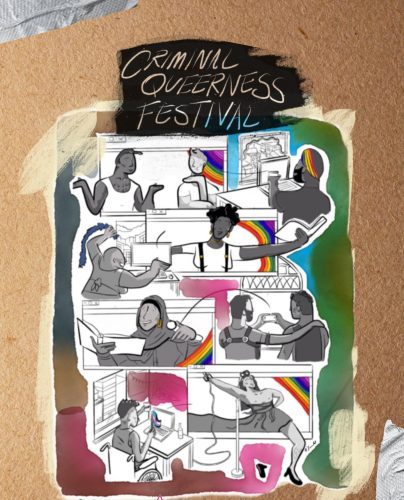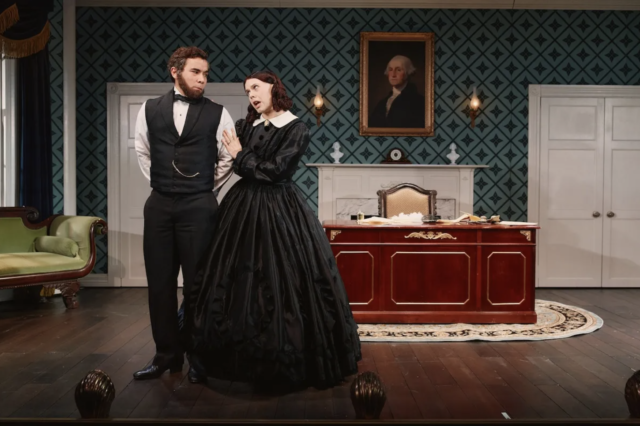
President Abraham Lincoln (Conrad Ricamora) and First Lady Mary Todd Lincoln (Cole Escola) have a rare pause in “Oh, Mary!” (photo © Emilio Madrid)
“OH, MARY!”
Lucille Lortel Theatre
121 Christopher St. between Bleecker & Hudson Sts.
Through May 12; moves to Lyceum Theatre June 26 – June 28, $49-$298
www.ohmaryplay.com
Cole Escola’s “Oh, Mary!” is the funniest, most outrageous show I’ve seen this season. I was finally able to catch it after several extensions at the Lucille Lortel — and now it’s on its way to Broadway, opening June 26 at the Lyceum. Nearly a week after seeing it, I’m still laughing about it.
In the eighty-minute farce, Escola plays the desperately unhappy Mary Todd Lincoln. It’s nearing the end of the Civil War, and President Abraham Lincoln (Conrad Ricamora) has had enough of the first lady, who has a fondness for booze; he’d rather spend private time with one of his young officers, Simon (Tony Macht). Mary wants to return to her previous career in cabaret, much to Abe’s displeasure, so he tells Mary’s chaperone, Louise (Bianca Leigh), to come up with other activities to keep Mary busy — and away from him. Abe himself suggests that Mary study acting, which he considers a far more respectable profession than cabaret, hiring a teacher (James Scully) who will change the course of the couple’s life.
Escola mines every line for hilarity while director Sam Pinkleton, who is primarily a choreographer, never misses an opportunity for physical comedy gold. Lincoln is not a brave, thoughtful leader but a complaining buffoon. “God, we’re screwed! We might as well surrender and kill ourselves now!” he tells Simon when the outcome of the war is still in doubt. When Simon advises they should meet with General Burnside, Honest Abe admits, “Let’s go. After dealing with my foul and hateful wife all morning, a little war might be a breath of fresh air.” Later, when Abe is looking to blow off more steam, Simon says that would make him very happy too. Abe asks Simon, “Would it? Would it put a big smile on your face to see me release everything I’ve got pent up?” Simon responds, “Of course. I want you to take it easy, sir.” To which Abe adds, “Oh, I’ll take it easy. And you’ll take it hard.”
Escola gleefully gobbles up the scenery as Mary appears in a drunken stupor, jumps on her husband’s desk, and gets oh-so-close to her daring acting teacher. She’s not exactly the most on-the-ball of first ladies. Each time the president mentions the North and the South, Mary asks, “The south of what?” Quoting Shakespeare, she recites to her teacher, “To be or not to be, that is a great question.” Excited to learn about subtext, she attempts to impress her teacher by explaining, “Well, a character might say, ‘Chicken tummy time’ when what they really mean is, ‘I’m hungry,’ only it doesn’t come out quite right because they’re inbred. Is that subtext?”
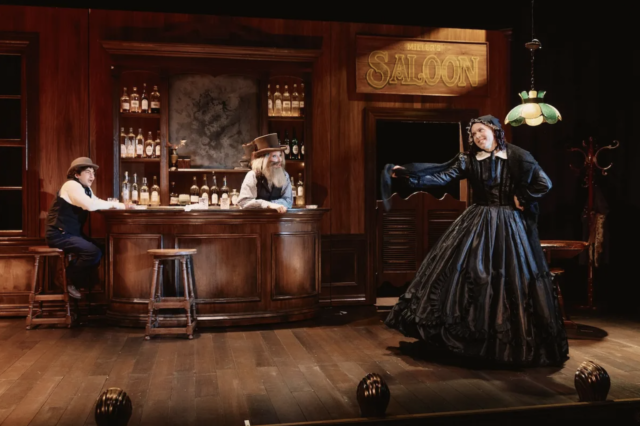
Mary Todd Lincoln (Cole Escola) is in search of alcohol and more in “Oh, Mary!” (photo © Emilio Madrid)
While some of the subtext is completely made up, some is based on fact or the gossip of the time. It has long been rumored that Lincoln might have had a thing for Union officer and law clerk Elmer E. Ellsworth, which was explored in Roger Q. Mason’s 2022 streaming play, Lavender Men. Mary did have a difficult life, losing three children and suffering from mental illness that Dr. John Sotos diagnosed in his 2016 nonfiction The Mary Lincoln Mind-Body Sourcebook as the effects of pernicious anemia, but she also was well educated, spoke French fluently, and had studied dance, music, and the social graces. Escola never merely makes fun of her but instead celebrates her with nonstop hilarity.
The set by dots is true-blue and unpretentious, from Lincoln’s White House office, complete with a portrait of George Washington looking down on the absurd proceedings, to a wood-paneled saloon. Holly Pierson’s period costumes are right on point, highlighted by Mary’s full-skirted black gown, as are Leah Loukas’s wigs, particularly Mary’s pigtails and Abe’s black hair and full beard. Cha See keeps it all well lit, with fun music by Daniel Kluger, who designed the sound with Drew Levy.
Escola, who scored with the online pandemic comedy special Help! I’m Stuck!, is magnificent as Mary, fully embodying her as they have a blast with her foibles while also honoring what she went through. It’s an unforgettable breakthrough performance by a writer-actor with a bright future. Ricamora (Here Lies Love, The King and I) is simply fabulous as more than just Escola’s, er, straight man, giving Honest Abe some surprise edges. Scully (The Erlkings), Leigh (The Nap, Transamerica), and Macht (The Alcestiad) all excel in their supporting roles.
The title of the show refers to the prayer to the Virgin Mary seeking protection from sin, but it also is a twist on the catchphrases Mary Tyler Moore’s character often said to her husband, “Oh, Rob,” and her boss, “Oh, Mr. Grant,” on The Dick Van Dyke Show and The Mary Tyler Moore Show, respectively; Moore changed television as a successful actress, singer, dancer, and producer, so Escola reverses the dynamic, seeing Moore as a kind of role model for Mary Todd Lincoln in a time warp.
The tongue-in-cheek lunacy even extends to the two-sided program card, which is styled like the one for Our American Cousin, the play Abe and Mary were watching at Ford’s Theatre when he was assassinated.
But the play gets serious as well. At one point, Mary asks her teacher if he has ever had a great day. She clarifies, “I mean a truly great day. The kind of day so great it imbues every single sad or boring or terrible day that came before it with deep meaning because from where you stand on this great day, all those days were secretly leading to this one. And you stand there, high on the hilltop of this great day, watching the sun set on your past, and it all looks so beautiful and so perfect and you think, ‘if only I could stay here, where I can see everything so clearly, where all of my hopes feel rewarded and all of my pain finally makes sense.’ But you can’t stay there. You have to come down the hill and walk into tomorrow and it becomes so clear that the sad days and the boring and the terrible days aren’t secretly leading anywhere.”
Any day that includes “Oh, Mary!” is a great day; we might not be able to stay there, but we can keep on laughing as we come down that hill and walk into tomorrow.
[Mark Rifkin is a Brooklyn-born, Manhattan-based writer and editor; you can follow him on Substack here.]
